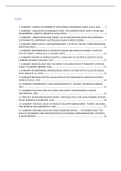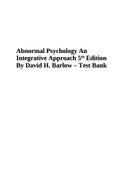Index
1. SUMMARY - MAKING SUSTAINABILITY SUSTAINABLE, MONTABON, PAGELL & WU, 2016........ 2
2. SUMMARY - DESIGN FOR SUSTAINABILITY (DFS): THE INTERSECTION OF SUPPLY CHAIN AND
ENVIRONMENT, ARNETTE, BREWER & CHOAL (2004) .................................................................... 5
3. SUMMARY - GREEN INNOVATION GAMES: VALUE-CREATION STRATEGIES FOR CORPORATE
SUSTAINABILITY, LAMPIKOSKI, WESTERLUND, RAJALA & MÖLLER (2004) ..................................... 7
4. SUMMARY GREEN SUPPLY-CHAIN MANAGEMENT: A STATE-OF-THE-ART LITERATURE REVIEW,
SRIVATAVA (2007) ......................................................................................................................... 11
5. SUMMARY ENVIRONMENTALLY CONSCIOUS DESIGN AND MANUFACTURING: A STATE-OF-
THE-ART SURVEY, ZHANG, KUO, LU & HANG (1997)..................................................................... 12
6. SUMMARY THE RISE OF CROWD LOGISTICS: A NEW WAY TO CO-CREATE LOGISTICS VALUE,
CARBONE, ROUQUET, ROUSSAT, 2017 ......................................................................................... 15
7. SUMMARY HOME DELIVERY AND THE IMPACTS ON URBAN FREIGHT TRANSPORT: A REVIEW,
VISSER, TOCHINORI, BROWNE, 2014............................................................................................. 17
8. SUMMARY DECARBONIZING INTRAREGIONAL FREIGHT SYSTEMS WITH A FOCUS ON MODAL
SHIFT, KAACK ET AL., 2018 ............................................................................................................ 19
9. SUMMARY METHODS FOR THE CALCULATION OF CO2 EMISSIONS IN LOGISTICS ACTIVITIES,
ZADEK & SCHULZ, 2010 ................................................................................................................. 20
10. SUMMARY INTERMODALITY AND SUNCHROMODALITY, TAVASSZY. BEHDANI & KONINGS,
2015 ............................................................................................................................................... 21
11. SUMMARY THE EVOLUTION OF CLOSED-LOOP SUPPLY CHAIN RESEARCH, GUIDE &
WASSENHOVE, 2009...................................................................................................................... 23
12. PRODUCT DESIGN AND BUSINESS MODEL STRATEGIES FOR A CIRCULAR ECONOMY, BOCKEN,
PAUW, BAKKER & VAN GRINTEN, 2016......................................................................................... 25
13. SUMMARY STRATEGIC ISSUES IN PRODUCT RECOVERY MANAGEMENT, THIERRY, SALOMON,
VAN NUNEN & VAN WASSENHOVE, 1995 ..................................................................................... 27
14. SUMMARY GREENING GOLIATHS VERSUS EMERGING DAVIDS — THEORIZING ABOUT THE
ROLE OF INCUMBENTS AND NEW ENTRANTS IN SUSTAINABLE ENTREPRENEURSHIP, HOCKERTS
& WUSTENHÄGEN ......................................................................................................................... 28
,1. SUMMARY - MAKING SUSTAINABILITY SUSTAINABLE, MONTABON, PAGELL & WU, 2016
Offsetting supply chain’s negative impact on environment and society do not create sustainable
supply chains. This study: move the field from the question of how can firms merely diminish
environmental or social problems to how supply chains can become truly sustainable.
1. Introduction
Key to instrumental logic is that economic performance is the goal,
not sustainability. Emphasis is on finding shared value and win-win
situations (profit), but that is not good for humans well-being.
Ecologically Dominant (ED) = alternative logic that can lead to truly
sustainable supply chains. 2 weaknesses:
• Logic is backward looking in that it studies existing
unsustainable supply chains to determine what they are
doing to become less unsustainable.
• While sustainable supply chain research is aimed at the
entire chain and all of its stakeholders, the reality is that it is
usually conducted from the perspective of focal firm.
The Ecologically Dominant logic not to attack existing unsustainable businesses, but to encourage
research on true sustainability.
2. The need for a new logic
Build new thinking → consider culture (organization’s or society’s values, beliefs, and ideology), logic
(frameworks that guide research and practice in sustainable supply chain management), cognition
(reflect how decisions are made within the supply chain).
Tripple Bottom Line (TBL) aspires to treat each of its 3 aspects with equal importance (social,
environmental and financial). It captures a chains performance. Natural Resource-Based View
(NRBV) = integrative theory of sustainability with the natural environment as a key constraint.
Sustainability should be addressed and measured in an integrative fashion to account for the impacts
on all stakeholders and both the TBL and NRBV are conceptually integrative.
Win-win perspectives:
• Total quality environmental management (TQEM) = Eliminating unneeded process steps to
reduce pollution while increasing profits
• Creating shared value (CSV) = Policies/operating practices that enhance the competitiveness
of a company while simultaneously advancing the economic and social conditions in the
communities in which it operates.
• Corporate social performance (CSP) literature = argues that literature suffered from
mismatch between “expectations, effects, and evaluations” and the stakeholders involved.
3. Developing a new logic
Sustainability = progressive maintenance of the life-supporting capacities of the planet’s ecosystems
requires the subordination of traditional economic criteria to criteria based on social and ecological
values.
Environment is the central constraint of Ecologically Dominant logic. Social aspect of sustainability is
2nd constraint → peoples quality of life. Goals ED: protection of social systems and increasing quality
of life. Means: Increased profits for members of a supply chain or increased GDP for an economy.
, Change is difficult because the economic aspect of TBL dominated political and public policy
discussions. 2 paths:
• Change regulation and enforcement. Future regulation is likely to require much more
transparency in firs reporting and to inhibit many activities that are presently allowed.
• Change from supply chains themselves. Previous research has shown tangible benefits to
firms adopting sustainability-related strategies that are beyond what current law requires.
4. Research propositions
Framework Ecologically Dominant sustainable supply chain management (6 propositions):







